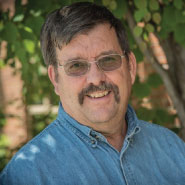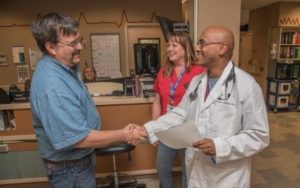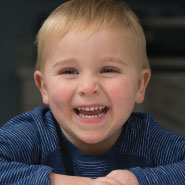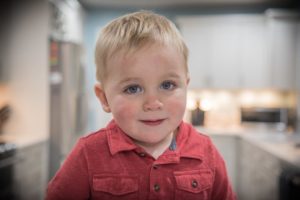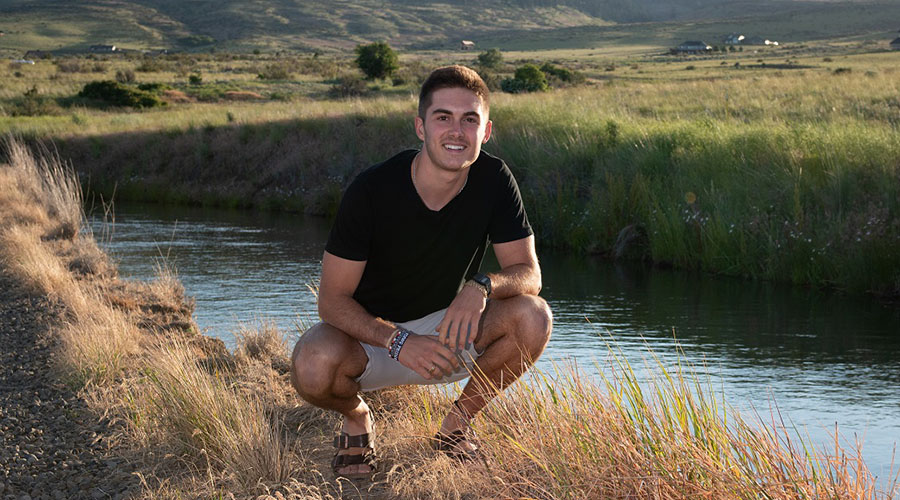
Meet Joe Davis, EHS Class of 2019. ASB President. Football, basketball, and track. An adventurous spirit, ready and willing to take on life’s challenges with the vigor of a healthy 18 year old.
Until the day in December when he ate his first macaroon.
“I figured I’d try it,” says Joe, who took one bite, not knowing the cookie was loaded with almond flour. It wasn’t long before he felt a reaction. “I thought, ‘Oh, there must be some nuts in that.’ And I went to my next class.”
This wasn’t Joe’s first tangle with nut allergies – a condition he shares with his mother, Janet. “There were times where he would accidentally eat nuts,” she recalls. “He’d have itching around his mouth, and his mouth ‘felt weird’ and swollen. Sometimes he’d tell me and sometimes he wouldn’t, but the symptoms would always resolve with time.
“It’s never been a real issue,” declares Joe. “I wait, drink some water, and it’s gone in 10 minutes.” He’d never had to use an epinephrine (“epi”) pen or mobilize the emergency plan established with his school.
This time was different.
“I went to a class for an hour. I wasn’t feeling better, so I stayed at school for lunch. Then I started getting hot and my body was really irritated, so I laid down on the couch in the ASB office.” At fourth period, Joe was joined by fellow ASB officers, who told him in no uncertain terms that he looked horrible.
“By then I was having a hard time breathing. My breath was really raspy.” Enter the white knight in Joe’s story: his best friend Connor Timko. Experienced with his own peanut allergy, Connor heard the labored breathing and knew what was happening. He told Joe, “You’re going into anaphylactic shock.”
“Thank God for Connor,” says Janet, who in the midst of a busy afternoon was on her way out the door when Joe called her, his voice barely audible. Once Janet figured out what was wrong, she had Joe put Connor on the phone. Her son’s friend described the symptoms he was seeing, and they agreed he should immediately drive Joe to the ER.
“Connor could get him there faster than I could,” she says. “I dropped everything and sped to the ER and met them there.” Within twenty minutes, she was joined by her husband Bob. By then, emergency staff had dosed Joe with epinephrine, steroids and Benadryl, and were closely monitoring his condition.
As a social worker on staff at KVH, Janet often serves in the emergency department. She considers it familiar territory. Nevertheless, “It’s so different when it’s your own kid. Joe is our youngest,” she says quietly, her voice catching.
The ER team involved in Joe’s care included provider Jocelyn Judd, and nurses Doug Henson and Susan Penick. “I have colleagues that hit the ground running and know exactly what to do,” says Janet. “I never felt like there was a question about the exact treatment. I could just be the mom and rely on them to do what they do best.”
It’s been over six months since that fateful evening, and Joe’s life is back to normal, with one glorious exception: certain nuts are now a regular part of his diet. Shortly after the ER visit, Joe had extensive allergy testing, which narrowed down the list of culprits to three: walnuts, pecans, and the one that sent him to the hospital – almonds.
Freed by this new information, on their way home from the allergist, Joe and his mom went shopping for things he’d always wanted to eat but never dared – pistachio ice cream, Nutella, and pesto sauce. “He loves it all,” laughs Janet.
Later this summer, the Davis family travels to Italy. This fall, Joe heads to Japan for a two-year mission, then to an out-of-state college. As terrible as Joe’s anaphylactic episode was for his entire family, Janet has found a silver lining. “Now, Joe can travel knowing he needs to be very careful and carry an epi pen. And he can enjoy foods that used to be off-limits.
“Things were lined up in the perfect way for Joe to get help and information he could use through the rest of his life,” she says, which according to Joe will include college track, and possibly a career in international business or cardiology.
“Whatever the future holds, it’ll be busy,” Joe grins. “I’m excited.”
